"Amazons" in the artists' villa
Due to the coronavirus, the festival curated by Alvaro Schoeck and Chris Walton was largely held without an audience on site. The concert, performance and symposium in the studio of Schoeck's birthplace in Brunnen could be followed via livestream.
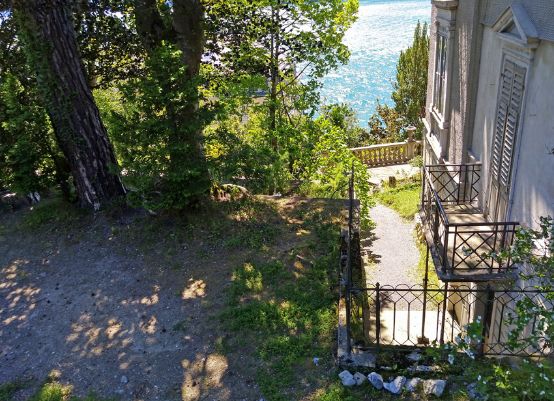
There is something theatrical about Brunnen on Lake Lucerne, with the water mirror as a stage and the mountains as a backdrop. If you wish, you can recognize pitches in the rise and fall of the peaks or a rhythmic form in the rise and fall of the waves during foehn storms. Untouched by the dramatic changes to the townscape over the last century, Villa Schoeck on the Gütsch is slightly elevated with a view of the lake. It is no wonder that Othmar Schoeck was fascinated by musical theater, with such images before his eyes.
This edition marks the start of a new cycle of the Schoeck Festival in Brunnen. The sponsoring association has set itself the task of embedding Othmar Schoeck's work in a larger context with an annual festival. This time, the focus was on images of women in Schoeck's works and in 19th and 20th century music theater. The festival title "Amazons" was a tongue-in-cheek reference to a particularly enigmatic figure in world literature and an almost avant-garde opera by the Brunner composer: Penthesileapremiered in Dresden in 1927 and has been a regular part of the repertoire of renowned opera houses ever since. But it was also intended to provide an outlook on women in artistic professions in connection with the #MeToo movement. The festival could have gone on for many more days before all the keywords were covered.
The fact that the board of the association did not allow itself to be slowed down or completely stopped by corona-related imponderables in the preparation and implementation of the festival is to be highly commended. Not having an audience was an adjustment that had a very direct impact on the budget. The livestream transmission placed high technical demands. And yet: the artists had the opportunity to play and the beautiful thematic focus did not fade into the background. On the contrary. Bravo to the festival organizers first and foremost.
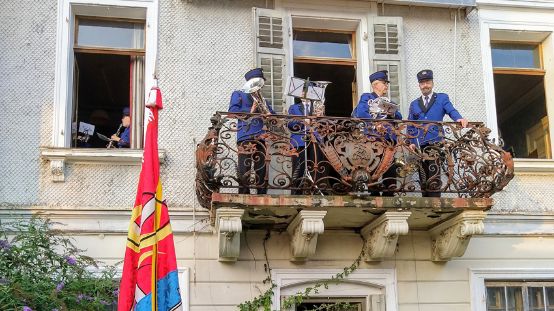
A serenade to kick things off: The Brunnen Music Society, conducted by Michael Schlüssel, played Schoeck's "Military March" from the windows of the Künstlervilla. Photo: SMZ
Brunnen and its inhabitants were actively involved. The music society kicked off the festival and explored the village in the footsteps of remarkable women, adding to the festival's focus on everyday history.
Confrontation and mixing in concert
The musical highlight of the festival on Saturday evening was eagerly awaited. Works by the contemporary composer Stefan Keller entered into a dialog with compositions by Othmar Schoeck. It proved to be a good decision by the festival directors to give space to contemporary art. Stefan Keller Three songs based on poems by Unica Zürn (world premiere), Swing (2015) and Piece for piano (2009) sounded exciting and were performed with great urgency and virtuosity. Truike van der Poelaccompanied on the grand piano by J. Marc Reichow, set strong emotional accents with the warm timbre of her voice, both for the songs of the Unica Zürn cycle and for the three Schoeck songs based on poems by Keller, Storm and Eichendorff op. 35. Rafael Rütti (piano) Mateusz Szczepkowski (violin) and David Snow (viola), which congenially combines the rhythmic tension of Stefan Keller's music with Schoeck's oeuvre (Andante in E flat major, Violin Sonata op. 46, Consolation and Toccata op. 29).
Alvaro Schoeck, a great-nephew of the composer, caused a minor sensation with the program compilation. It was unbelievable how the pieces resonated with each other and with their performance venue. They will probably never sound the same again in this dialog of confrontation and intermingling.
The performance in the studio of the Schoeck Villa was an emergency solution as a result of the corona restrictions, whereby the music revealed hidden and exclusive references to the space (after all, it was partly created here). The excellent acoustics and suitability of the studio for chamber music were also evident. We can only hope that the concert reached its audience via livestream. And also that this historic location and the villa as a whole will be preserved, a wish whose scope was further outlined in a panel discussion at the very end of the festival.
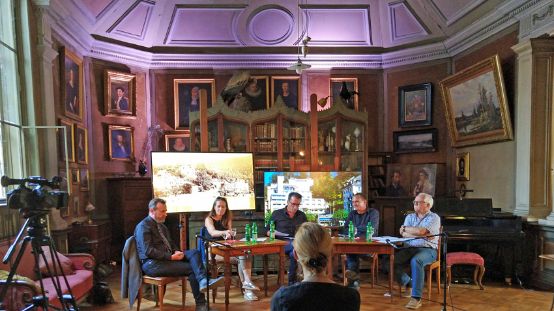
Panel discussion on the future of Villa Schoeck
From left: Chris Walton (music historian, Schoeck biographer), Monika Twerenbold (cantonal monument preservation), Christoph Dettling (architect, moderator), Roger Aeschbach (scenographer), Josias Clavadetscher (cultural commission of the municipality of Ingenbohl). Photo: SMZ
Wit and daring in the cabinet of curiosities
The performance homELESS was shown on two evenings and led back to the thematic focus. One speaker (Stephanie Gossger), a singer (Anna Schors), a pianist (Hélène Favre-Bulle) and women who have written music history in one way or another were suddenly in the room, including Fanny Mendelssohn and Clara Schumann, Pauline Viardot and Ethel Smyth, Cécile Chaminade and Alma Mahler. Daring combinations, embedded in text fragments by Colette, the versatile variety artist, author and passionate campaigner for women's rights. HeimatLOS plays virtuously with the voices of 19th and 20th century female artists who struggled with their claim to a stage life, subjectively, painfully, wittily and confidently. What worked for Colette and culminated in her celebrated retirement at the Palais Royal in Paris is a challenge for young women today, despite equal rights.
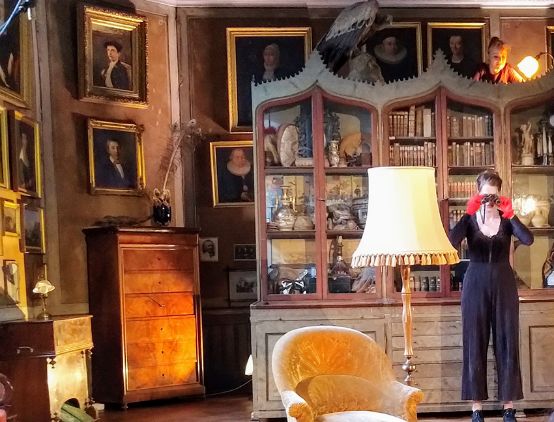
Performance "heimatLOS" in the artists' studio. Together with director Tamara Heimbrock, Anna Schors (front), Stephanie Gossger (above) and Hélène Favre-Bulle developed a play tailored to the space. Photo: SMZ
The director Tamara Heimbrock be grateful for their courage, their erudition and their good reference library, which has made the wealth of associations of homELESS were the basis. The lyrics of the poems and songs were not just atmospheric images, but a system of references to women, each of which depicted an entire universe. Alongside Colette, Marlene Dietrich (her famous song If I could make a wish praises the renunciation of fulfillment as the real secret of enjoying life), Pauline Viardot (the celebrated diva of the Belle Epoque and Turgenev's muse) and Mascha Kaléko (as a Jew, she experienced a particularly tragic but stoically endured discomfort that filled her poetry with never-ending warmth and tenderness). Another trail led to the composer Judith Weir, who achieved the greatest possible professional recognition as Master of the Queen's Music. A hodgepodge? But yes. This is exactly what the Wunderkammer principle of the studio space, which was played with wit and daring by the artists, is all about. References to the performers' own history were edited into the film and showed their lives today: Berlin subway instead of Palais Royal, birch grove in Mauerpark instead of aristocratic country estate and the vibration of a railroad bridge instead of waltzing in the Savoy ballroom.
Between music theory and performance practice
During the day, the Atelier was twice a meeting place for international musicology, both physically and virtually. A top-class symposium in cooperation with the Institute of Musicology at the University of Zurich (Inga Mai Groote, chair of the panel discussion) and the Mariann Steegmann Foundation under the direction of Merle Tjadina Fahrholz with female voices and female roles in 19th and 20th century opera (program and CVs of the participants at https://schoeckfestival.ch/wp-content/uploads/2020/08/frauen-stimmen.pdf). The balance between music theory and performance practice was very successful.
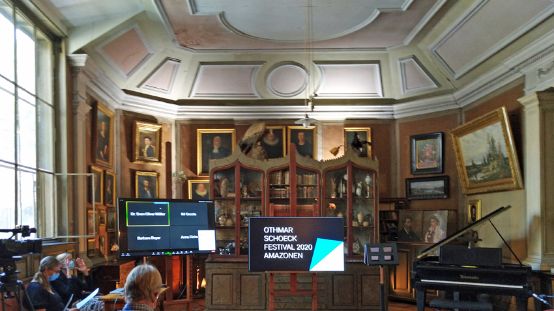
International Symposium "Women:Voices - Roles and Personalities"
Subtitle: "Opera in transition from the 19th and 20th centuries". Some speakers were connected via Zoom, lectures and discussion rounds were streamed live. Photo: SMZ
The social situation of female stage artists between 1870 and 1930 was examined, the attribution of immorality to female singers, the dilemma of success, because because gainful employment was considered reprehensible for middle-class women, financial success was all the more so. From a moral point of view, a life as an artist could be nothing other than a failure. Women tried out individual career strategies by staging themselves as divas or tying themselves to famous names, one example being the alto Ilona Durigo (1881-1943) and Othmar Schoeck. As an interpreter of his songs from 1911 onwards, she played a role in his biography that was perceived as binding by the public. The Zurich patron Mathilde Schwarzenbach called them a "musical couple" (Anna Ricke).
Barbara Beyer, a dramaturge and director with practical experience on numerous opera stages in German-speaking countries, gave an outline of images of the feminine from Claudio Monteverdi's L'incoronazione di Poppea about Händel's Alcina to the female roles of the 19th century. While baroque opera was extremely experimental in its play with gender roles - in this respect, the artistic practice of the time is a forerunner of feminist research today - in the bourgeois age, the role and character images became more fixed. Stereotypes emerged that often made women the victims of their love. What was special about this, however, was that the man's soul was saved. In the 19th century, marriage and gender were important topics of discourse, reported music historian Melanie Unseld, hardly anything else preoccupied society so much in the 19th century. The natural differentiation between the sexes was based on a strict dichotomy: the man was the normal, proper sex, the woman the "other" sex, beautiful, weak, inadequate.
And Penthesilea? Schoeck was in his late thirties when he took on the material, and we don't know what exactly motivated him to do so. Penthesilea's bloodthirsty murder of the unsuspecting Achilles is pure battle of the sexes, but in Kleist's work, the Amazon queen's rebellion against a normative social order appears to be the real drama. Did Schoeck follow him in this? He wrote provocatively expressionist music with unusual instrumentation that was a hit with audiences.
Consistently inductive, the conductor and mediator Graziella Contratto in the analysis of Schoeck's images of women: She moved from the small structural unit to the larger insight. By including not only large stage works but also songs in her considerations, she brought astonishing things to light: Othmar Schoeck dealt with female figures who were outsiders, be it the enigmatic Peregrina (op. 17 No. 4), the vagrant heroine of a cycle of poems by Eduard Mörike, the violent Venus, a rebel who physically destroys her admirer, or the terrible Penthesilea, who fails because of her excess of feelings. Then the change: "With the birth of the daughter Gisela, not only did a change take place in the personality of the apparently happily fulfilled father in his social behavior, but also in the compositional aesthetics can be seen, for example, in the Stargazer op. 52/7 demonstrates that the texture has a greater inner resonance, an even more careful care of the polyphonic voice tissues. Is it a protective gesture that also contributes to a repression of the past catastrophes of the Second World War or simply a transfiguring perspective of old age, inwardly warmed by fatherhood?"
The next festival will take place from September 10 to 12, 2021 under the motto "passé composé" - Neoclassicism in Switzerland.
https://schoeckfestival.ch
The Swiss Music Newspaper was the media partner of the 2020 festival.








